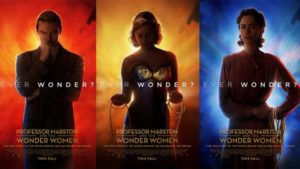
 (4 / 5)
(4 / 5)
She is one of the most iconic female characters in pop culture. She is instantly recognisable and you most likely know her name. She stands for truth. But in creating her secrets had to be kept to preserve love.
Earlier this year the mass audience were introduced to Wonder Woman through her first film. Now she is more popular than ever, this is the perfect time to tell this fascinating story of the deep psychological ideas that went into her creation and first few stories as well as the just as interesting behind the scenes situation of the people that inspired her.
The man who co-created her was man named William Moulton Marston (Luke Evans), a university professor who teaches psychology. He would go on to invent the lie detector machine. While there with his wife one of his students catches his eye. His classes teach about the mindset of giving yourself up to an authority figure in a relationship.
Elizabeth (Rebecca Hall) is his official wife whom he has known since childhood, she has dark hair and is more than qualified to be a lecturer at any University, but because she is a woman she cannot gain any diploma. Her and Marston enjoy heated debates. Olive (Bella Heathcote) is blonde, a few years younger and even though she is descended from two of the most outspoken and radical feminist of her time was raised by nuns so is timid and tacked but still very intelligent.
He loves his wife, however he also loves Olive and they love him as well as each-other. What are they to do? The love is real but the society in-which they live will never accept them, is it even worth trying?
Luke Evans himself is a gay man and the writer/director Angela Robinson is a lesbian. They are both open about their sexuality but the world still does not fully embrace people of non hetero sexuality so they are probably the perfect people to tackle this material.
Adding to the revealing nature of the movie is the layering of the actual Wonder Woman comics that were written by Marston and indeed do feature Wonder Woman herself and other women caged, tied-up, spanked etc. The fact that they were able to get approval for the actual material shows and bravery and how unashamed on behalf of DC Comics. This is the story and ideas that went into the character and are addressing it.
The theory of loving submission isn’t just all about getting tied-up and/or spanked (though the physical acts are a part of it) it is about letting go of control, it has been said that you cannot love someone and control them, the acts allow the others to be the master to ones who would otherwise not be.
Being that this takes a look behind the public perception of a famous character and shows the story of the real people behind the scenes one will probably be reminded of Hollywoodland (an equally good movie).
This movie tells the story of love that is still rather unconventional now and seemingly impossible at the time it happened. There are details about the production of the character of Wonder Woman that are skimmed over as well as a few other moments that take a leap in time in order to fit the correct running time. But the story it tells is one of love and understanding and it effectively conveys that message.

Jonathan Evans
Get The Chance has a firm but friendly comments policy.
